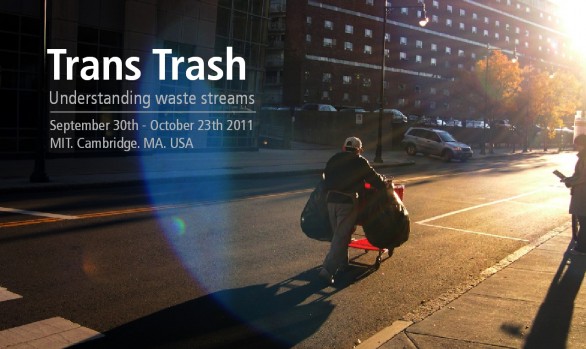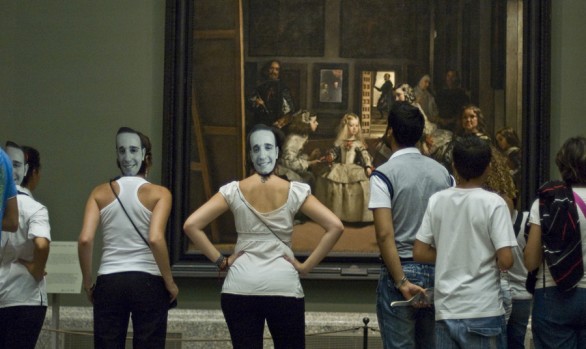Das Detroit Projekt
CuratorshipWe were invited by Sabine Reich, co-director of the festival, to curate the zaragozan participation in Das Detroit Projekt.
We curated together with Paul Domela (Liverpool) and Marta Keil (Gliwice).
THE CITY MUST BE OURS!
A massive crisis is hitting Europe. We have to overcome it. We’ve heard both things so many times they don’t make much sense anymore. Still, Spain has a 27% unemployment rate, and it seems that, whatever we do, it will be included in our future.
Zaragoza (700,000 population) had its go on big events (Universal Exposition Zaragoza 08), its placement on logistics and its try on digital economy. And massively relied on real estate economy in the last decade housing bubble. All those processes made it walk, staggering, into a confusing place where it seems anything can happen. Sounds familiar?
The collectives participating from Spain in DAS DETROIT PROJEKT share a certain view on cities and on the future that have been practising for some years now. Much before the housing bubble exploded, they decided to take a hold on their closer environment. They also share a way of collective thinking (all of them are collectives), to the point they have been designing together their interventions, and a way of developing bottom-up cultural processes, calling for all Bochum citizens to join their projects.
Using such different tools as graffitti and urban art, street dancing, art and architecture, and frequently mixing them up, they got to develop projects that eventually took them to a place from where they could actively collaborate in the self-management of their hometown: urban planning, social processes, arts, festivals, cinema and theaters, mobility and spaces have been affected by their practices. Still, the economic question is always an issue: how can we make a decent living when rich get richer and austerity sends us to the lowest- end of our already precarious economies? With their hybrid Their hybrid practice between activism, management, creation and promotion, and putting together the Detroit Labs and the Festival, all their works will also try to answer the question on how to access to a decent standard of living after a salary- based society.
All creators invited worked as a team. Both as a single team and as teams theirselves. No individual artists were invited.
They all joined forces with local communities.
They participated at once, and they expanded they worked in Zaragoza
Participating artists were:
Basurama – From Madrid. Bochumer Freizeit und Pflege Werk
Together with en tu punto, ALAS and Stiftung Freizeit
Residents at FKT they got together to work around “Collective Luxuries”: we cannot face the future without counting on what we already have. Texto largo.
The public system of free hiring and building of deckchairs clearly recalls the deckchairs at the London Parks, a centennial service that might seem anchored to the luxuries for the few of the victorian times. Rethinking how can we make those luxuries not individual, not only for few, but for everyone, seems like the most appealing task for this Europe in demolition. How can we save what is common.
Festival Asalto – Urban Arts Festival Greetings from Zaragoza Mural
Asalto sent two artists to Bochum (Danjer and Le Désert), in order to paint a mural in one of the busiest spots in town: Central Station, Subway exit. The municipality received the paint with happiness, confronted to the 1970s mural depicting factories and cars. The new one says have a nice trip in the most psychedelic manner, a more suitable situation for the times being. Even thought they couldn’t collaborate with local artists, during their stay, the urban artists were invited to paint every spot in town, but couldn’t attend any invitation. The interest in graffitti is ever growing, and Zaragoza is one of its strongholds.
Esto no es un solar project – Gravalos di Monte Architects. HU Kitchen
Nacho and Patrizia participated with their teenager kids Juan and Pablo in this project. They decided to work hand in hand with HUKultur, the project runned by Matthias Köllmann in his neighbourhood of HUStadt that is a mix of cafe, cultural center and social hub. Espresso Mobile is already serving coffee as a rolling branch office for the headquarters, and it was to be improved with a bigger, better equipped rolling kitchen, where more people could work and make a living out of. Kurdish cuisine from that kitchen deserves to be tasted, so they both decided to create the HU Kuche
They bought a 2nd hand caravan, and renovated it together with the production team, neighbours (thanks, Faruk!) and theirselves. Including a set of infinite tables and a couple of funky features (the rooftop greenhouses and the neon HU sign that were to be the best messagers in town for its liveliest and less visited neighbourhood, HUStadt, a 70s housing blocks project now in use by refugees and migrants from more than 20 countries.
A_Zofra – Metropolitan studies group of Zaragoza. NO JOB LAB
A_Zofra developed a research around the possibility of building a decent life withouth salaries. The “No Job Lab” they created explored a growing reality of unemployment (more than 25% rate in Spain during 2014) and cooperative economy, both in Zaragoza and Bochum, starting precisely with the very participants of this pack.
In the first workshops, they found a set of concepts that were to be treated, in order to adress the main question of their research. Among them:
The whole research can be read in their webpage: http://nojoblab.tk/en/
Festival Trayectos – Urban dance festival. Coreographic Map of Bochum
Trayectos dancers teamed up with “Renegades”, a local dancing company resident in Schauspielhaus Bochum
Under the most rainy spring in years, they managed to dance in a number of spots, and create a “corepgraphic map” (below), including a dance step proposed by two migrant teenagers. Zeitgeist in a happy version (both as in Pharrell Williams’ Happy and as in happiness).
DETROIT LAB in Zaragoza
The “Detroit Lab” (a series of seminars organized in every participant city) in Zaragoza was organized by eTOPIA on oct 2nd-4th october 2014. A summary of the meeting can be read here.
An impressive cross-thinking was delivered, showing to the germans the lively and happy, yet precarious solutions that have been developed in Zaragoza during the last years. the very day after the closure of its EXPO2008, Lehman Brothers announced its bankrupcy, starting the ongoing crisis, and since then, a bunch of projects, initiatives and situations have been growing, both institutional and civic, legal and illegal. Cooperative economy, arts, new public spaces, cutting edge technology and 3D making. It might not look as sparkling as gold, but indeed proposes a future.
Conclusion: A HAPPY, COOPERATIVE FUTURE.
Industry, even when it might seem rich or wealthy, might not be available for a few years on in Europe. We deliberalety left aside 3D making (another main interest in Zaragoza) of the projects, trying to focus in other ways of economy. Entrepeneurship, new technologies, education, hipsterism, crafts and “creative cities” are in everyone’s mouth as solutions for this crisis, but they all share one wrong view: they are all taken as individualistic, competitive approaches. The spanish projects of This is not Detroit turned out to be as cooperative as thought from the beginning: teams worked together, interacted with local community, and highlighted and focused in the existing assets of Bochum and RuhrGebiet, the existing possibilities working together, fighting inequality and putting the money were it will serve more people. With Qualitative indicators, for example.
We specially like that the participation had a few different generations and cultures involved: from the 7 moths old Eloy, son of Raquel En tu punto to the 60s of the participants at BFPfW, kids in the ALAS and Stiftung Freizeit workshops, teenagers dancing, youngsters painting and thirty somethings building, discussing and (not) working, the 40s of the curators and the 50s of the artists using FKT, the migrants at HUStadt…


